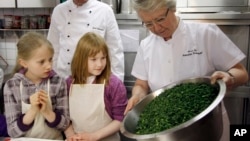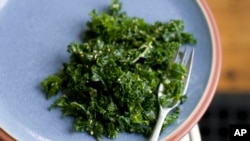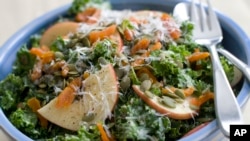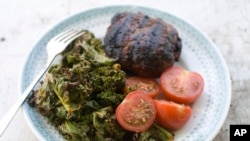From VOA Learning English, this is the Health Report.
To prove that there is a celebration for just about everything, October 1 officially marked National Kale Day in the United States.
That’s right – National Kale Day.
The big day of national celebration may have passed, but that does not mean you should not eat kale.
First, what exactly is kale?
Kale is in the same family as broccoli, cauliflower and cabbage.
For people in Russia, kale is kapusta. In Italy, it is called cavolo. Hindi speakers call it gobhi. Or if you speak Japanese, the name is karu.
Different areas may have different names for kale, but it is a super healthy food -- whatever you call it.
In fact, in the United States, many people are calling it a “SuperFood.” That does not mean it can fly over tall buildings like Superman and rescue people. (Well, actually, maybe it does). It does keep people healthy and keeps them safe from sickness
Kale's health benefits
Kale is filled with healthy nutrients. It provides 1,000 percent of the daily recommended allowance for vitamin K. In other words, by eating kale you more than meet the nutrition requirements set by United States health officials.
Kale also has nearly 100 percent of the daily suggested intake of both vitamin A and C. That information comes from the U.S Department of Agriculture. Kale also has folate, a B vitamin that is important for brain development. It also has many other essential vitamins and minerals. Kale is good for your heart and may help fight against some kinds of cancer.
So, kale is good for us. It also tastes great. And there are many ways to cook it.
Cooking terms and kale recipes
The vegetable kale can be tough or hard. But it keeps more nutrients if you don’t cook it too much. Here is a trick. Simply rub or massage the kale leaves with olive oil and seasonings. The leaves will break down and soften. The stems, or stalks, will remain tough. But you can sauté them or place them in soup for added vitamins and taste.
After you massage your kale, add a little more olive oil and sweet balsamic vinegar as a dressing – or your own favorite salad dressing. Add your favorite toppings for a healthy and delicious salad.
Steaming kale on the stovetop is a really healthy way of cooking this leafy green vegetable. First boil a pot of water and steam the kale on top in a steamer container.
You can also lightly sauté kale with garlic, some hot pepper and a little salt for a simple, delicious and healthy side dish. A side dish is a smaller dish that goes with the main meal.
Sautéed kale with nuts also goes well with fish. Kale is tasty when sautéed with foods like tomatoes or red peppers.
You can mix or drizzle kale with olive oil and bake it for 15 minutes until it gets crispy. These are called kale chips. You can also bake it on top of pizza for a healthy topping.
So eat some of this wonderful vegetable in your next meal. Your body will thank you.
Do you have a special way to prepare kale? Share your recipe in our comments section. This will give you the chance to use some of the cooking terms you heard in this story.
I’m Anna Matteo.
And now let’s get cooking … with some cooking words in this story.
______________________________________________________________
Words in this Story
salad – n. a mixture of raw green vegetables (such as different types of lettuce) usually combined with other raw vegetables
drizzle – v. to pour a small amount of liquid onto or over something
boil – v. to become so hot that bubbles are formed in a liquid and rise to the top
steam – v. to cook, heat, or treat (something) with steam; n. the hot gas that is created when water is boiled
sauté – v. fry quickly in a little hot fat
soup – n. a food made by cooking vegetables, meat, or fish in a large amount of liquid
bake – v. to cook (food) in an oven using dry heat
In our comment section, let us know if you want to hear more about food and cooking words.
Now it’s your turn to use these Words in this story. In the comments section, write a sentence using one of these words and we will provide feedback on your use of vocabulary and grammar.








